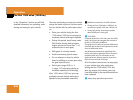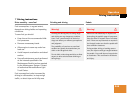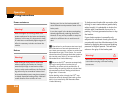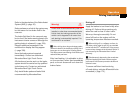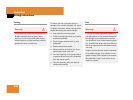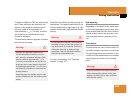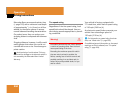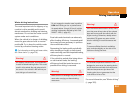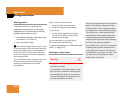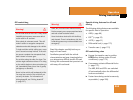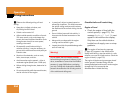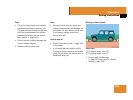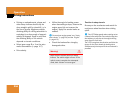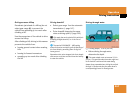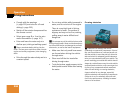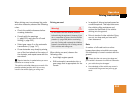
252
Operation
Driving instructions
Standing water
To prevent water from entering the
passenger compartment or the engine
compartment if you must drive through
standing water, keep in mind
ț the maximum depth of the water may
not exceed 19 in (48 cm)
ț you must drive slowly
For more information, see “Driving through
water” (
୴ page 257).
Passenger compartment
!
Do not drive through flooded areas or water
of unknown depth. Before driving through water,
determine its depth. Never accelerate before
driving into water. The bow wave could force
water into the engine and auxiliary equipment,
thus damaging them.
If you must drive through standing water, drive
slowly to prevent water from entering the
passenger compartment or the engine
compartment.
Water in these areas could cause
ț damage to electrical components
ț wiring of the engine or transmission
or could result
ț in water being ingested by the engine
through the air intake, causing severe
internal engine damage.
Any such damage is not covered by the
Mercedes-Benz Limited Warranty.
Warning! G
Always fasten items being carried as
securely as possible.
In an accident, during hard braking or sud-
den maneuvers, loose items will be thrown
around inside the vehicle, and cause injury
to vehicle occupants unless the items are
securely fastened in the vehicle.
The rear cargo compartment is the preferred
place to carry objects. Always use cargo
tie-down rings, and if so equipped, always
use partition net* when transporting cargo.
The partition net* cannot secure hard or
heavy objects. Always fasten items being
carried as securely as possible using the
cargo tie-down rings in the cargo compart-
ment floor and fastening materials.
Do not load items on the roof. It may cause
instability during some maneuvers which
could result in an accident. This vehicle is
not intended to carry items on its roof. Thus
roof rails and roof mounted ski or bike
holders must not be used.



